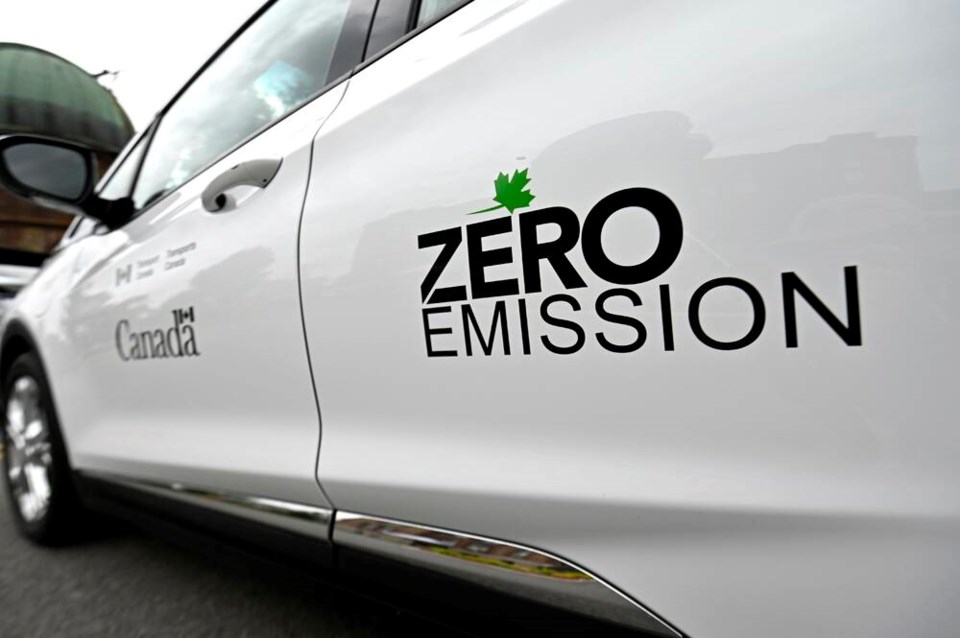There’s a lodge owner in northern sa国际传媒 with an electric-vehicle charging station.
So far, so good.
He’s climate-change conscious, going out of his way to assist like-minded guests and riding a commendable trend.
But there’s a complication.
It’s powered by a diesel generator, which undercuts the premise somewhat. The lodge is off the grid, so the entire operation runs on generators.
It’s a mirror-image illustration of a problem the NDP government has when it comes to fighting climate change.
Premier David Eby continued the push Monday for more carbon-tax fairness after Prime Minister Justin Trudeau made changes to the federal scheme that confer special benefits on some regions. Eby and the other premiers objected to the changes because they “treat Canadians differently.”
But there’s significant unfairness in one of sa国际传媒’s own climate-change measures — the zero-emission-vehicle law — for an opposite reason. The ZEV law applies evenly to everyone. But there isn’t much recognition of a crucial point — winter temperatures reduce electric vehicles’ efficiency in the north and east.
Peace River North MLA Dan Davies cited the lodge as he and BC United colleagues from cold-winter ridings objected to new legislation that accelerates the push for electric vehicles.
“It is absolute silliness — this cookie-cutter legislation, where one rule across the board is somehow acceptable, when it isn’t.
“We need to be looking at the province as the diverse province that it is.”
The bill updates several key steps taken in the past few years to encourage ZEVs and limit gas-powered vehicles. Energy Minister Josie Osborne said the numbers of ZEVs have increased by 2,500 per cent in the last six years and they now make up 20 per cent of light-duty vehicle sales.
The definition of “light duty” is changed to capture three-quarter-ton pickups, which are common in the North.
Davies said: “I cannot even fathom an electric farm vehicle operating in minus-30 conditions outside the Lower Mainland. It’s going to be catastrophic for the resource sectors, farmers. It’s going to be catastrophic for the average British Columbian.”
The target date by which 100 per cent of light-duty vehicles sold in sa国际传媒 must be zero-emission is advanced to 2035 from 2040.
But an interim target coming much sooner has been changed much more dramatically.
East Kootenay MLA Tom Shypitka said the new interim targets will have a drastic impact. The legislated schedule currently calls for 30 per cent of light-duty vehicle sales to be electric by 2030. That is being changed to 90 per cent by that date.
Car makers are effectively fined thousands of dollars for every gas-powered vehicle that is over the percentage of the total sales limit.
Honda sa国际传媒 wrote to many sa国际传媒 politicians this year objecting to being charged $20,000 for gas-powered vehicles over the limit.
“Given the unreasonable targets of sa国际传媒’s mandate, Honda sa国际传媒 has paid close to $65 million to comply until 2025, and could pay up to $550 million between 2026 and 2030.”
CEO Jean Marc Leclerc said that money could be better spent on research and development and bolstering manufacturing to meet demand.
He said the government has no analysis or evidence to justify the increases, which will drive prices higher. He said there could be a reduction in offerings and availability and leakages of sales to other jurisdictions.
The federal government is outlawing gas-powered cars by 2035, but the interim target for 2030 is 60 per cent of light-duty vehicles sold must be ZEVS. Honda wanted sa国际传媒 to match that.
Shypitka said there is a likelihood that unintended consequences will hurt the goals that sa国际传媒 is setting.
“These aggressive targets will hamper the exact solutions we all want to see in the long run.”
Energy Minister Josie Osborne said the cold-winter worries are addressed in the law because it makes allowances for plug-in hybrids — electric vehicles with gas-powered backup.
There are such options working in northern sa国际传媒 now, she said, and technology will develop more of them.
The legislation is important to send signals so industry can prepare for the new targets.
She said the law is very flexible and offers a number of compliance pathways for suppliers and dealerships.
But it’s going to take some gifted car sales people in the north for sa国际传媒 to go from 20 per cent to 90 per cent electric in just six years.
>>> To comment on this article, write a letter to the editor: [email protected]



